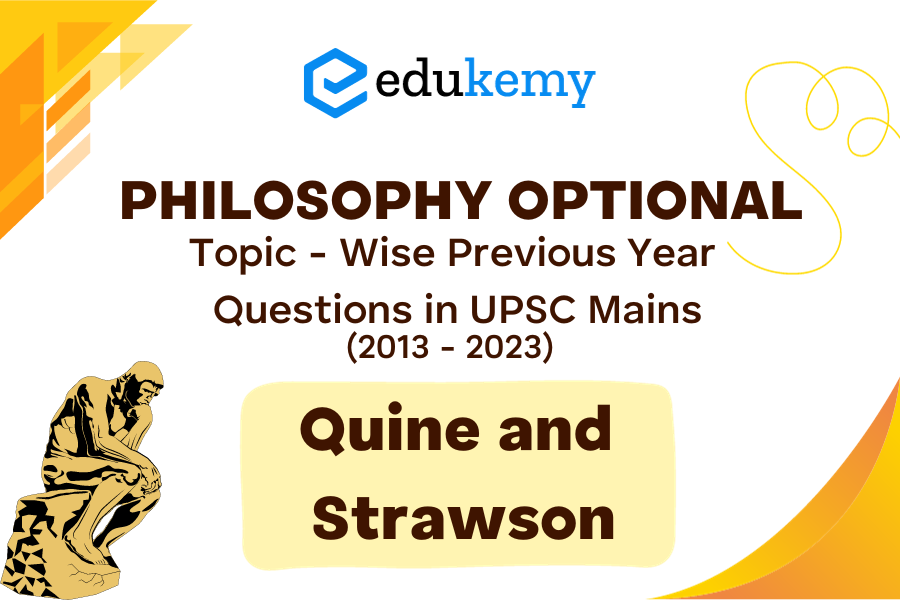
Philosophy as an optional subject in the UPSC (Union Public Service Commission) Mains examination is an intellectually stimulating and highly regarded choice for aspiring civil servants in India. This optional subject delves into profound questions about the nature of reality, existence, and knowledge, making it an ideal choice for those with a deep curiosity about the fundamental aspects of human existence. One of the crucial aspects of preparing for the UPSC Mains examination is a comprehensive understanding of the previous year’s question papers. In this blog post, we will explore a specific set of questions from the years 2013 to 2023, focusing on the philosophical giants Willard Van Orman Quine and Peter F. Strawson. These questions will not only serve as a valuable resource for aspiring civil servants but also provide a glimpse into the timeless relevance of philosophical inquiry in contemporary governance and policy-making.
Willard Van Orman Quine and Peter F. Strawson are two eminent figures in contemporary philosophy, renowned for their groundbreaking contributions to the fields of epistemology, metaphysics, and language. The UPSC’s inclusion of questions related to their works underscores the significance of philosophy in the realm of civil services. As we embark on this journey through the UPSC’s previous year questions on Quine and Strawson, we will unravel the intricacies of their philosophies, explore how their ideas have shaped contemporary thought, and gain insights into how these ideas can inform public administration and decision-making. Join us on this intellectual odyssey as we dissect, analyze, and discuss the wisdom encapsulated in these questions, ultimately equipping you with a deeper understanding of these philosophical giants and their relevance in the context of one of India’s most prestigious examinations.
Contents
- 1 Quine and Strawson Philosophy – Previous Year Questions (UPSC CSE Mains History Optional)
- 2 FAQs on Quine and Strawson
- 2.1 1. What is Quine-McCluskey and how does it relate to digital design and logic circuits?
- 2.2 2. Who is Willard Van Orman Quine, and what is his philosophical significance?
- 2.3 3. What is Quine’s philosophy of empiricism, and how did it challenge traditional empiricist views?
- 2.4 4. What is Quine’s naturalism in philosophy, and how does it differ from other philosophical perspectives?
- 2.5 5. How did Willard Van Orman Quine contribute to the philosophy of language and the understanding of meaning?
- 3 In case you still have your doubts, contact us on 9811333901.
Quine and Strawson Philosophy – Previous Year Questions (UPSC CSE Mains History Optional)
1. What are the two dogmas of empiricism that Quine attacks ?What are his arguments against what he calls the second dogma ?(2017/15)
2. Discuss Quine’s attack on the analytic-synthetic distinction.(2016/10)
3. Strawson’s distinction between ‘M’ and ‘P’ predicates.(2015/10)
4. Elucidate Quine’s arguments to show that analyticity is not synonymity.(2015/15)
5. How far are Quine’s arguments in ‘two dogmas of empiricism’ justified ? Discuss. (2014/10)
6. Explain and evaluate Strawson’s arguments for his conception of the nature of Person. (2013/10)
7. Explain critically Quine’s rejection of the analytic synthetic distinction and his subsequent philosophical arguments.(2012/15)
8. Is Strawson’s concept of person a refutation of Hume’s concept of self? Discuss. (2010/30)
9. What are Quine’s objections with regards to the verification theory of meaning? (2009/30)
10. State and discuss Strawson’s theory of Person. (2007/60)
11. Quine’s criticism of analytic-synthetic distinction. Short Notes.(2005/20)
12. Strawson’s notion of person as primitive. Notes. (2003/20)
13. Quine’s attack on Analytic-Synthetic Distinction. Short Notes.(2002/20)
FAQs on Quine and Strawson
1. What is Quine-McCluskey and how does it relate to digital design and logic circuits?
Quine-McCluskey is a method used in digital design to simplify Boolean functions and minimize logic circuits. It is a systematic approach for reducing complex expressions to their simplest form. By employing this technique, engineers can optimize the performance and efficiency of digital systems.
2. Who is Willard Van Orman Quine, and what is his philosophical significance?
Willard Van Orman Quine was a prominent American philosopher known for his work in epistemology, ontology, and the philosophy of language. He is particularly famous for his arguments against the distinction between analytic and synthetic statements, which had a profound impact on the philosophy of language and the nature of knowledge.
3. What is Quine’s philosophy of empiricism, and how did it challenge traditional empiricist views?
Quine’s philosophy of empiricism, often referred to as “radical empiricism,” questioned the traditional distinction between observational and theoretical language. He argued that it is impossible to isolate our sensory experiences from the theoretical concepts we use to interpret them, challenging the conventional views of empirical knowledge.
4. What is Quine’s naturalism in philosophy, and how does it differ from other philosophical perspectives?
Quine’s naturalism is a philosophical approach that emphasizes the continuity between philosophy and natural science. He advocated for a holistic and scientific worldview, asserting that the methods of empirical science should also guide philosophical inquiry. This stands in contrast to more traditional, a priori approaches to philosophy.
5. How did Willard Van Orman Quine contribute to the philosophy of language and the understanding of meaning?
Quine’s work in the philosophy of language, notably his critique of the indeterminacy of translation, challenged the conventional understanding of meaning. He argued that meaning is deeply entwined with our overall conceptual scheme and is not a matter of isolated definitions. This perspective had a significant impact on the study of language and meaning in philosophy.
In case you still have your doubts, contact us on 9811333901.
For UPSC Prelims Resources, Click here
For Daily Updates and Study Material:
Join our Telegram Channel – Edukemy for IAS
- 1. Learn through Videos – here
- 2. Be Exam Ready by Practicing Daily MCQs – here
- 3. Daily Newsletter – Get all your Current Affairs Covered – here
- 4. Mains Answer Writing Practice – here

